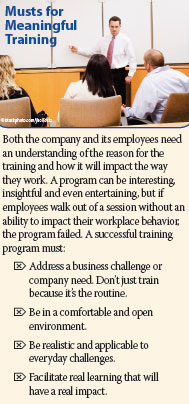News
Behind the scenes: A closer look at employee training
Engagement, relevance lead to effective training in a melting-pot workforce.
January 4, 2009
 Recent employee satisfaction and engagement studies, including our own at Personnel Decisions International have noted that development opportunities are a key factor in employees' overall job satisfaction and a top reason they stay at a company.
Recent employee satisfaction and engagement studies, including our own at Personnel Decisions International have noted that development opportunities are a key factor in employees' overall job satisfaction and a top reason they stay at a company.The most important part of the training came when we discussed this new appreciation of the generations. |
Each generation was described by the major influences of its age and by characteristics typically shared among its members.
We explained that instead of stereotyping by generation, we simply were presenting one lens through which to view some of the differences in the workplace. Individually, people should be evaluated on their personal views, motivations, abilities and characteristics. But the purpose of the training program was to understand on a macro level that some generational trends impact employees' approaches to the workplace.
Once the participants understood the premise of the training and learned about the perspectives of each generation, we separated them into four multigenerational teams and asked each team to take on the characteristics of one generation. Then, we asked them to evaluate what was great about the company and what needed improvement through the eyes of their assigned generation.
We then put groups of individuals together, asking them to retain their perspective based on the generational viewpoint they were previously assigned. The new multigenerational groups were presented with a business problem and asked to figure out how the company should address it. This  led to passionate — and sometimes argumentative — discussions.
led to passionate — and sometimes argumentative — discussions.
For instance, one business challenge was the concept of relocation. As relocation is common for retail managers, the challenge felt realistic and relatable. Baby boomers are used to moving where the company assigns them — it's just part of the job. But Gen X and Gen Y insisted that this was a large request with a major impact on their social and personal lives. Solutions for this problem depended greatly on the generational perspective.
The business examples illustrated the power of generational differences for the group and the nuanced challenges it represented for the company and its leaders.
Impact of the session
 ChatGPT
ChatGPT Grok
Grok Perplexity
Perplexity Claude
Claude




